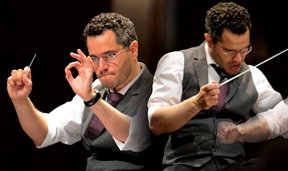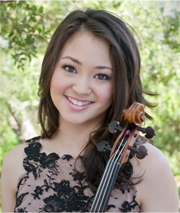By Robert D. Thomas
Music Critic
Pasadena Star-News/San Gabriel Valley Tribune/Whittier Daily News
A version of this article will be published Friday in the above papers.
______________________
Pasadena Symphony; David Lockington, conductor
Shostakovich: Festive Overture
Leonard Bernstein: Serenade for Solo Violin, Strings, Harp and Percussion (after Plato’s “Symposium”); Anne Akiko Meyers, violinist
Stravinsky: Le Sacre du Printemps (The Rite of Spring)
Saturday at 2 p.m. and 8 p.m. • Ambassador Auditorium; Pasadena
Information: www.pasadenasymphony-pops.org
_____________________
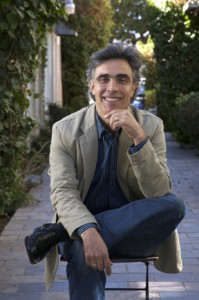 When David Lockington (right) takes the podium Saturday at Ambassador Auditorium, it will mark a new chapter in the 86-year history of the Pasadena Symphony, as he becomes the orchestra’s fifth music director and the first to hold the position since Jorge Mester in 2010.
When David Lockington (right) takes the podium Saturday at Ambassador Auditorium, it will mark a new chapter in the 86-year history of the Pasadena Symphony, as he becomes the orchestra’s fifth music director and the first to hold the position since Jorge Mester in 2010.
However, it will also mark a new chapter in the life of the 57-year-old Lockington, a career that has spanned two continents and carried him from coast to coast in the United States. Although he was born in England, in a sense he’s returning to family roots because his wife, acclaimed violinist Dylan Jenson, was born in Los Angeles and has many family members in Southern California.
Saturday’s programs, at 2 p.m. and 8 p.m. will include Shostakovich’s Festive Overture; Stravinsky’s The Rite of Spring; and Leonard Bernstein’s Serenade, with violinist Anne Akiko Meyers as soloist. This marks the second consecutive concert Meyers has soloed for a conductor making his PSO debut; in 2010 it was James DePreist leading his first concert as the orchestra’s Music Advisor.
Meyers (below, right) will also be playing an historic instrument: the “Ex-Vieuxtemps” Guarneri del Gesu, which was crafted in Cremona, Italy in 1741 and got its name from a former owner, Belgian violinist and composer Henri Vieuxtemps. Earlier this year, Meyers received lifetime use of the “Vieuxtemps” for concerts and recitals thanks to an unnamed benefactor who purchased it at a Chicago auction (read more about the story of Meyers and her violin HERE).
Lockington has served as the Music Director of the Grand Rapids Symphony Orchestra since 1999 and has held the same position with the Modesto Symphony since 2007 (where he worked with current Pasadena Symphony Association Executive Director Paul Jan Zdunek). He is also Principal Guest Conductor of the Orquesta Sinfonica del Principado de Asturias in Spain.
However, when he was named PSO Music Director last March his focus changed. He’s not yet certain whether he and his family, which includes three grown children and a daughter in middle school, will relocate from Grand Rapids to Southern California. Nonetheless, he says, “I’ve always had a strong belief that if I can’t literally live where I’m working that it’s important for me to have a strong presence in the community, and that certainly will be the case with Pasadena.”
Since he first conducted the Pasadena Symphony in January 2012, Lockington has been in the city five times, meeting people and planning for the future. “The Pasadena Symphony musicians are so quick and so responsive and so professional, says Lockington. “They want to be led but they have a strong desire to make it work and are willing to go wherever you take them, However, if we don’t reach people, if I’m not strongly enough here as the face of the orchestra, then we won’t be doing our job.”
One thing that Lockington has learned is the Pasadena Symphony musicians’ high quality. “Southern California is a London sort of situation with this incredible pool of musicians,” notes Lockington from first-hand experience. Over the years, he has collaborated with several London orchestras; a new recording of Vivaldi’s The Four Seasons he and Meyers made with the English Chamber Orchestra (the first with Meyers playing the “Vieuxtemps” violin) is scheduled to be released next Valentine’s Day.
Although Lockington will continue to conduct the Modesto Symphony, he will end his relationship with the Grand Rapids Symphony after next season. “That will be 16 years with the orchestra and will mark its 85th season,” explains Lockington. “It was an appropriate time to move on to another chapter.”
He remains unsure about the Spanish job. “My contract is through end of next year (he has led up to 10 concerts a year) and after that we’ll see,” he says. “I love going there,” he says with a chuckle. “Among other things, I can take a long weekend to visit my mother, who still lives on the outskirts of London.”
That kind of innovative planning characterizes Lockington’s musical life, as is evidenced by Saturday’s program. The Rite of Spring was an obvious gift,” says Lockington, “because this year is its 100th birthday. I suppose virtually every orchestra has programmed it (Lockington opened the current Grand Rapids Symphony season with the work).
“Gustav Mahler said of his music, ‘My time will come.’ You wonder whether Stravinsky could have imagined the vast number of performances of “Rite of Spring that have taken place this year and how it has become a staple of orchestral repertoire. It doesn’t have the same shock value as when it premiered, but when you look at the audience attendance numbers every time it’s played it draws well. That shows how more sophisticated audiences have become.”
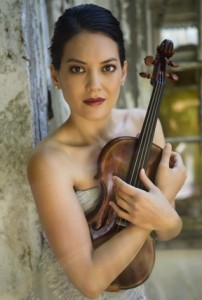 Bernstein’s Serenade is much less known than The Rite of Spring Nonetheless, says Lockington, “I love this piece. It’s not typical of Bernstein; it’s so different than West Side Story, which was composed in 1957, three years after Serenade. There are measures that sound sort of Russian. There’s something knotty about it that reminds me of the Russian school. I think of it as a mid-century look at a musical language that was made possible by The Rite of Spring.”
Bernstein’s Serenade is much less known than The Rite of Spring Nonetheless, says Lockington, “I love this piece. It’s not typical of Bernstein; it’s so different than West Side Story, which was composed in 1957, three years after Serenade. There are measures that sound sort of Russian. There’s something knotty about it that reminds me of the Russian school. I think of it as a mid-century look at a musical language that was made possible by The Rite of Spring.”
Although this is the only PSO concert that Lockington will conduct this season (orchestra schedules are typically planned several years in advance), he will lead three of the five classical concerts beginning next year; the other two will be led by newly named Principal Guest Conductor Nicholas McGegan.
Lockington also indicated he would be open to conducting a summer concert at the Los Angeles County Arboretum; he has led outdoor concerts in Grand Rapids and Modesto and attended two concerts at the Arboretum last summer. “The setting is great and the programs are so diverse, always interesting,” he marvels. “I think it’s amazing so see so many people sitting at so many tables; it was mind-boggling! I loved the atmosphere and the peacocks in the background.”
Like many conductors, Lockington was an instrumentalist before he took up the baton. In his case, he played the cello, first in a youth orchestra conducted by his father and later for two years in the National Youth Orchestra of Great Britain (where one of his colleagues was Andrew Shulman, now the PSO’s principal cellist).
Lockington came to the U.S. to earn a Master’s degree at Yale University (he is now a U.S. citizen). He played cello in the New Haven Symphony and was assistant principal cellist for the Denver Symphony for three years before turning to conducting.
“I spent a lot of time observing conductors and what worked with them,” says Lockington. “As a cellist and sitting up front, I had a perfect nest-eye view of what was going on. Being unencumbered by my instrument was also important. If I’d been a violinist, I would have had my instrument in my ear but sitting with my head free couldn’t have been a better way to learn.
“Because I played the cello in an orchestra, I know first-hand what being an orchestra musician is like,” continues Lockington. “I realize it’s a stressful life and I know from experience the precision that’s required, the preparation, the emotional, mental and physical energy it takes to be engaged for long periods of time. So I have a lot of empathy and sympathy for musicians.
“I’m still a practicing cellist,” notes Lockington. “It keeps me honest. I’m asking people to do things every single day that I do when I practice. I know the process and efficiency that’s required to keep in shape and to be able to pull something off in a short period of time. So, in a funny sort of way, I feel like it gives me a license, the right to demand these sorts of things of people because I’m doing it every day.”
Lockington believe there’s another advantage that he has as a cellist. “Being in touch with the string family, the main sound producer of the orchestra, means that the sound I can draw out of the strings affects the total sound of the orchestra,” he believes. “Being a string player means that the sound I listen for and the sound that I draw out is different than if I were a pianist or a horn player for example; not necessarily better, just different. I hope it’s colorful and I hope it’s beautiful. The music has to be special and we have the musicians to do that here.”
_______________________
(c) Copyright 2013, Robert D. Thomas. All rights reserved. Portions may be quoted with attribution.
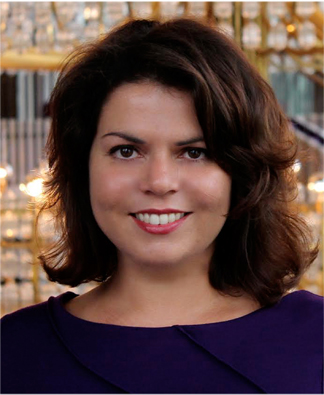 Just when we thoughts things had settled down at the The Pasadena Symphony Association the wheel turns again. The association, which, operates the Pasadena Symphony and POPS, today announced that it has tapped Lora Unger (right) as its new Chief Executive Officer, effective November 1. Read the Pasadena Star-News story HERE.
Just when we thoughts things had settled down at the The Pasadena Symphony Association the wheel turns again. The association, which, operates the Pasadena Symphony and POPS, today announced that it has tapped Lora Unger (right) as its new Chief Executive Officer, effective November 1. Read the Pasadena Star-News story HERE.
